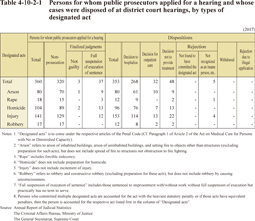Section 2 Medical Care and Treatment System for Mentally Ill
The medical care and treatment system for the mentally ill covers [1] a person who has committed a designated act (arson, forcible indecency, rape, homicide and robbery, including an attempt of these offenses, and injury) but was not prosecuted as a conclusive disposition of a public prosecutor for the reason of insanity or diminished capacity at the time of the act, and [2] a person, either found not guilty on the ground of insanity or who received a mitigated sentence on the grounds of diminished capacity at the time of the designated act (excluding those sentenced to imprisonment and the execution of the sentence was not suspended) and the judgment has been finalized. A hearing for either [1] or [2] is initiated, in principle, upon an application by a public prosecutor. The hearing is to be heard by a panel consisting of a judge and a mental health expert (psychiatrist) to determine the necessity of medical treatment and, if found necessary, the expected treatment. At the hearing, the court may request the director of the probation office to research living condition of those persons.
Table 4-10-2-1 shows the number of persons for whom public prosecutors applied for a hearing and the number of persons whose cases were conclusively disposed of at the hearing by types of designated act.
Table 4-10-2-1 Persons for whom public prosecutors applied for a hearing and whose cases were disposed of at district court hearings, by types of designated act
Those with the decision on a need for hospitalization are hospitalized in designated inpatient care hospitals (designated by the Minister of Health, Labour and Welfare) where they receive specialized medical care in accordance with the system.
The manager of designated inpatient care hospitals are required to apply for confirmation every six months of the need to continue the hospitalization of subject persons, and for their discharge from the hospital immediately after it is deemed no longer necessary for them to remain hospitalized to receive medical care.
Those who receive a decision on their need for outpatient treatment or permission to be discharged from a hospital by a court must then receive outpatient medical care at a designated outpatient care hospital (designated by the Minister of Health, Labour and Welfare) for three years, in principle, and are placed under mental health supervision by probation offices during the period.
